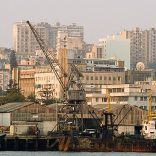Mozambique: Venâncio Mondlane charged with five crimes, incitement to collective disobedience and ...
Overlaps aside, Renamo insists on “irreversible” election of district administrators

File photo: DW
Mozambique will hold its seventh general and legislative elections within two years. This will be the third time that the country has elected members of provincial assemblies, the second time that it has chosen provincial governors, and the first time it will have directly elected district administrators.
However, the election of district administrators remains a matter of debate in the country. There are those who argue that the country still does not have the technical and financial conditions to support the functioning of the entire administrative machinery that will result from this process, combined with the appointment of the figure of Secretary of State in all districts.
The Mozambican National Resistance (Renamo), one of the proponents of decentralisation in the country, says that the appointment of the Secretary of State is a heavy “burden” for public accounts. But, in an interview with DW Africa, José Manteigas, spokesman for Mozambique’s largest opposition party, says that the election of administrators is irreversible.
DW Africa: How does Renamo react to this debate on the lack of technical and financial conditions for the country to elect district administrators?
José Manteigas (JM): This issue of fattening, or of creating a heavier machine in terms of the State Budget, was created by Frelimo itself. See now, at the time of the election of the Provincial Governors. But because Frelimo was not sure it would win the elections, it created the figure of the Provincial Secretary of State, which is a big overlap. In fact, this is a thorn in Frelimo’s side too, because the entities themselves, the Governor and the Secretary of State do not understand each other at all in terms of competences in the Province. Therefore, the election of Administrators will not be an overload, because when we share the Districts, it is the same machine.
DW Africa: But the issue here is the overlapping of the administrative machine. Doesn’t Renamo think that this is heavy too?
JM: The problem is exactly this imposition of Secretary of the State in the District, because Article 8 of the Constitution of the Republic provides for the principle of universality of the State. Therefore, outside the State, there are other public entities, such as Autarchies. And the Autarchies will never exercise their powers and competences outside the principles established in our national legal system.
DW Africa: In that case, will there be decentralised district elections in 2024, from Renamo’s point of view?
JM: The Constitution provides [for them] and no one can, at their own pleasure, violate the Constitution to the point of not complying with what emanates from our own Magna Carta.
DW Africa: Objectively, are conditions in place for that?
JM: They are. Just as there were conditions to elect governors, why can’t there be conditions to elect administrators?
DW Africa: There are those who argue that, at this moment, it was still necessary to improve the provincial decentralisation process, and then proceed to the district to fill all the gaps that the law presents.
JM: The big obstacle in this decentralisation process is the Secretary of State. That is where the problem is.
DW Africa: How should this problem be addressed?
JM: Taking it away from the national political chess, because there’s no need for that to exist.
DW Africa: And how is it done?
JM: How is it done? The solution is to stop appointing [them].
DW Africa: But the problem is that this is already legislated. And now Renamo, for example, has a proposal to present to the Assembly of the Republic for the removal of the Secretary of State.
JM: For these upcoming elections, clearly there is a big impediment, because the time frame, even the limits for the revision of the Constitution, are largely exceeded. Therefore, we will continue to have this imposition of the Secretary of State for these elections in 2024. Renamo legally could not and does not even have the requirements of one third [of the seats in parliament] to table a constitutional review. So this is an evil that is here to stay, but we believe that in the next five years this problem will certainly be resolved and we will have to remove this figure.
Source: Deutsche Welle












Leave a Reply
Be the First to Comment!
You must be logged in to post a comment.
You must be logged in to post a comment.